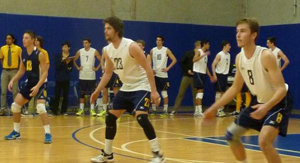The UC Santa Cruz men's volleyball team spent its season honing sets and kills, doing conditioning, and watching game film. Team members also sold donuts and athletic gear, worked on their résumés, and picked up trash on the beach.
The unusual regimen was born not just from the financially strapped squad's need to raise money in order to compete, but also from Head Coach Todd Hollenbeck's decision to approach this team in a new way: by building solid human beings first, both on the court and in life.
"I tell the guys we're looking at the giant spectrum of life, not just one season," says Hollenbeck, sitting in a cluttered office in the West Field House. He wears red sweatpants, sandals, and a Slug volleyball T-shirt.
"It's not about wins and losses. It's how can we score points when we're not even touching the ball. We do that in the classroom, in applying for a job, and by volunteering. We're building a strong person from the ground up and adding volleyball."
The team not only ended the season with a 24-6 record and earned a visit to the NCAA Division III national championships in Hoboken, N.J., by finishing in the top 1 percent of independent programs in the West, but it also walked away with a team GPA of 3.1 and a sense that the squad had jelled into a professional and cohesive group.
"This year, it was about classiness and professionalism," says Jake Hurwitz (College Eight '15, marine biology), team captain who plays libero on the squad. "We held ourselves to a higher standard."
There's nothing glamorous about the men's Slug volleyball programs. Because of budgetary constraints and the fact most of the Division III volleyball teams are on the East Coast, the group has to raise $40,000 of its own money just to get to tournaments and competitions. Their uniforms are old, they cram five players into a two-bed hotel room for away games, and often get up at 4 a.m. to catch the cheapest flights to their matches. In addition, with majors including astrophysics, electrical engineering, physics, and economics, there are also long hours of study.
In the past, the stress of schoolwork, practice, fundraising, travel, and competition had sometimes led to a volatile season, but, this year, Hollenbeck took away the emphasis on wins and losses, and instead concentrated on doing the small things each day that build skills and character.
In addition to three hours of hard daily practice, the squad did beach cleanups, went to job fairs, and worked on their résumés. On trips, they held study sessions and took required tests with Hollenbeck as proctor.
"If you can get each guy to focus on building character, it builds trust on the court," says Hollenbeck, who was inspired to walk this new path by a successful junior college coach he knows. The result was a squad that "did the right thing, even behind closed doors." They got good grades, showed class, and learned about trust, leadership, communication, and being a follower when needed—all skills that translate to a world beyond the university.
"The biggest win for us was the lessons," Hollenbeck says.
For Hurwitz, who plans to head to Europe for a professional volleyball tour in the fall, the season was an exercise in steadiness, in calming his sometimes fiery style, which led to more success.
"It was always one step at a time, one foot in front of the other," he said. "At the end of the day you find you've taken a lot of steps."


